
But those tech platforms in general are hereby set aside for an interesting take from a Facebook’s executive speaking about his own platform. Thanks in part to a New York Times report that has since spread, an internal memo has become public. One could speculate if that was the hope or not, but either way, it is out.
Not only the NY Times, but CNN, Fox Business, CNBC and others in media are now reporting and/or weighing in on this internal memo’s insights and commentary. As 2020 is here, and this is about both political results in 2016 and what’s coming in 2020, it seems like a fitting item for tonight’s featured focus. That will be found below standard fare below that immediately follows, left-right headline bullets and market snapshot graphics that lead up to our featured focus and closing ticker for manufactured housing connected stocks.
Periodic readers of this business-nightly feature should note there are a few tweaks to some of the standard portions of our evening market/investing report. Read carefully as some changes of the ‘standard text’ that follows before our left-right headlines and also in other features near the end of tonight’s reports.
Every evening our headlines that follow provide snapshots from two major media outlets on each side of the left-right news spectrum that reflect topics that influence or move investor sentiment. In moments on this business evening report, you can get ‘insights-at-a-glance.’
This report also sets the broader context for manufactured housing markets, in keeping with our mantra, “News through the lens of manufactured homes and factory-built housing” ©.
We begin with headlines left-of-center CNN followed by right-of-center Fox Business. We share closing tickers and other related data courtesy of Yahoo Finance, and more. 5 to 10 minutes reading this MHProNews market report every business night could save you 30 minutes to an hour of similar reading or fact-gathering elsewhere.
Perhaps more important, you will get insights about the industry from experts that care, but also dare to challenge the routine narrative that arguably keeps manufactured housing underperforming during an affordable housing crisis.
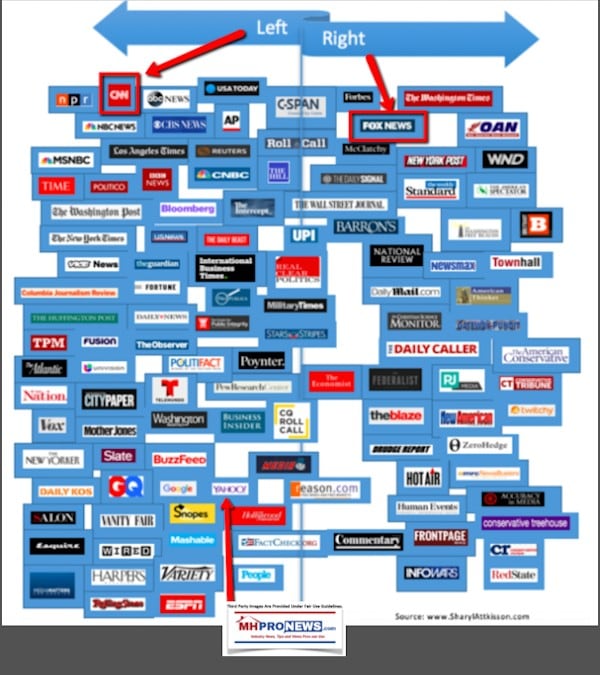
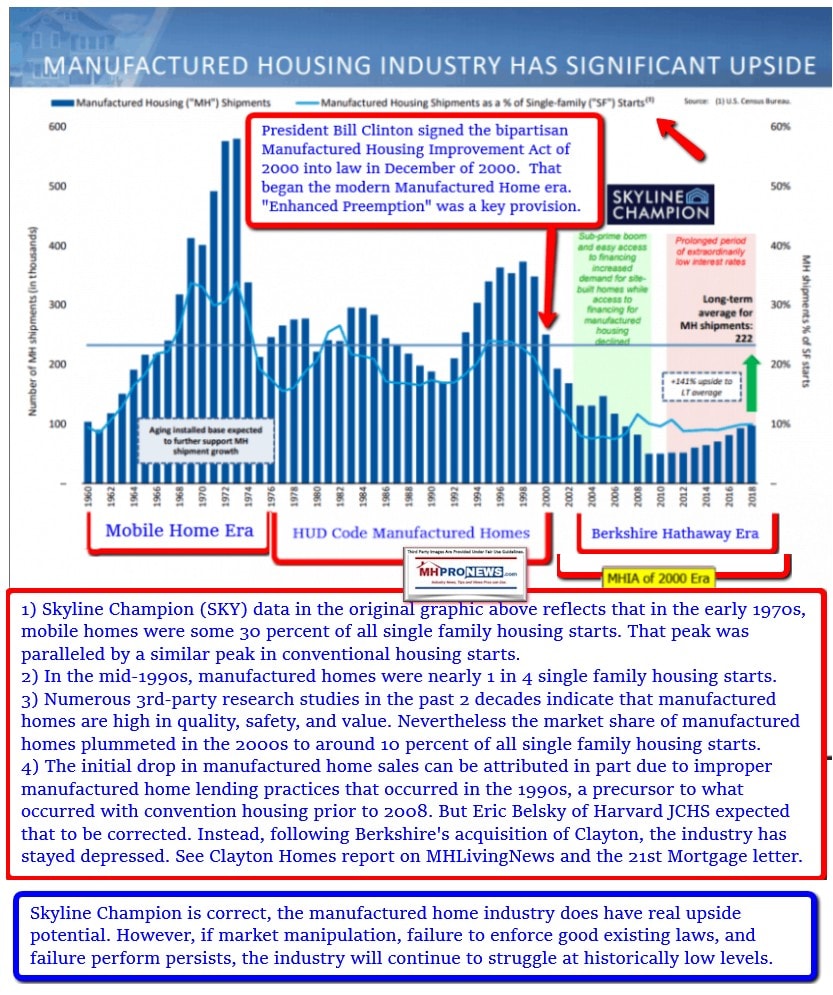
Newsy, Peeling Back Media Bias, Manufactured Housing Sales, Investing, Politics, and You
Headlines from left-of-center CNN Business.
- Facebook exec: We got Trump elected
- Trump ran the best Facebook ad campaign in 2016, and it could happen again in 2020
- Privacy is the star at CES this year
- Iran overtakes the trade war as the new election-year uncertainty
- Trump’s Iraq threats could backfire on oil and gas prices
- Warren Buffett has $130 billion in cash. He’s looking for a deal
- Bluetooth is about to get its most important update in 20 years
- Here’s everything we know about Sony’s PlayStation 5
- Perdue Farms’ new meat-packing foam dissolves in your sink
- Top Facebook exec: Yes, we got Trump elected and it may happen again
- Why Netflix is partnering with Goop and its controversies
- Tesla will make the Model Y in Shanghai and design an ‘original car’ in China
- Aston Martin’s troubles mount as profits slump by 45%
- Pier 1 Imports will close nearly half of its stores
- A couple from ‘The Bachelor’ is under investigation
- Startup releases list of 7 biggest retirement mistakes people make
- Watch Elon Musk dance like your drunk uncle
- This could be the most valuable Ford Mustang in the world
- Why people are buying vacation homes — before they’ve even bought a first home
- Ikea to pay $46 million to family of toddler crushed by dresser
- Fake kids products are turning up for sale on Amazon
- Google cuts Xiaomi’s access for showing photos of strangers’ homes
- Smart camera maker Wyze hit with customer data breach
- A hacker accessed a family’s Ring security camera and told their 8-year-old daughter he was Santa Claus
- WHAT’S NEXT FOR GHOSN
- Carlos Ghosn is now free to speak out. Japan’s reputation could suffer
- Japan issues arrest warrant for Carole Ghosn
- Nissan still pursuing legal action against former boss
- Japan vows to tighten immigration rules after escape
- Turkish private jet company says rogue employee helped Carlos Ghosn flee Japan
Headlines from right-of-center Fox Business.
- ‘Significant’ oil wells with ‘prolific’ potential discovered off South America
- It is the second significant discovery in the region in less than a month.
- Coal power collapses to lowest point in decades
- Stocks fall as investors eye US-Middle East tensions, within grasp of record highs
- Lakers superstar passes on nine-figure contract, chance to play with LeBron James
- Census Bureau hiring 500K workers across US — find out how much you could make
- How to play the wild bull market in 2020
- WATCH: Pat Sajak’s daughter fills in on ‘Wheel of Fortune’ amid surgery
- Sports Illustrated operator defends making ‘difficult’ decisions
- USC reportedly makes bombshell claim amid Lori Loughlin cheating scandal
- Jeopardy! ‘Greatest of All Time’ match will crown show’s biggest winner
- Harvard economist makes troubling prediction about USMCA trade deal
- Satisfaction guaranteed: Sex toys make hot return to CES trade show
- Beloved country music band makes stunning announcement
- Tesla zooms past two American auto icons to make history
- Streaming TV programming for kids embraces iconic brands
- Hunter Biden custody judge slams firm for ‘frivolous’ filings
- SEE PICS: Tom Brady’s mansion takes multimillion-dollar hit
- Who is most likely to suffer Iranian cyberattack?
- Boeing makes new recommendation to pilots flying troubled 737 Max jet
- Billionaire explains how handouts won’t solve America’s homeless crisis
- Judge threatens to throw Harvey Weinstein in jail during courtroom blowup
- REVEALED: Chelsea Clinton’s huge haul from cushy corporate board gig
- Las Vegas Raiders’ Allegiant Stadium, by the numbers
- U-Haul renters moving to these parts of the country
- Billionaire investor Ron Burkle’s young son found dead at home
- ‘Elephant walk’ at Utah Air Force Base showcases 52 F-35s launching in a row
- Internet connections to Smart TVs grow as streaming options increase
- ObamaCare still working despite individual mandate’s repeal
- How much Michael Bloomberg likely paid for Super Bowl commercial
- YouTube rolls out changes to children’s content
- State legalizes weed, sells out of $10M worth almost immediately
- Rolls-Royce cruises to new sales record with help of Cullinan SUV
- Trump moves to undo Obama-era housing rules
- Warren’s new economic plan looks to cause a fight with Biden
- White House proposes guidelines for regulating the use of AI
- Lab found chemicals in water near SC airbase
- Starbucks adds plant-based drinks to permanent menu
- Iran’s oil muscle weakened by US energy dominance
- Japan issues arrest warrant for Nissan ex-chair Ghosn’s wife
- Some CBD pet products found to not contain ingredient, researchers find
- Facebook bans potentially dangerous form of online video
- ‘Bachelor’ couple accused of colluding to win $1M in DraftKings tournament
- Largest talc study gives no clear link to ovarian cancer
- Elon Musk dances to celebrate first deliveries of made-in-China Tesla vehicles
- Biggest Palm Beach luxury real estate sales of 2019 show market still sizzling
- Trump scores a trade war win on his favorite report card
- Space-baked cookies and ‘mighty’ mice back on Earth via SpaceX
- Logan Paul, Antonio Brown tease potential fight in brief social media spat
- US, France set deadline to avoid all-out trade war
- Leagues finally cash in on sports betting by selling data
- Goldman Sachs makes sweeping changes to match peers
10 Market Indicator Closing Summaries – Yahoo Finance Closing Tickers on MHProNews…

Featured Focus – Where Business, Politics and Investing Meet

First, we’ll sample some reports and analysis on what Facebook VP Andrew ‘Boz” Bosworth said that made news today. That will be followed by some MHProNews commentary and analysis.
Per CNBC:
- Facebook Vice President Andrew “Boz” Bosworth said the company was responsible for getting President Donald Trump elected in the 2016 U.S. election because “he ran the single best digital ad campaign I’ve ever seen from any advertiser.”
- In his memo, Bosworth touches on Trump, Russian interference in the 2016 U.S. election and the March 2018 Cambridge Analytica scandal.
- Bosworth called Cambridge Analytica “pure snake oil and we knew it.”
From CNN Business today:
A Facebook executive who backed Hillary Clinton’s 2016 election campaign told colleagues in an internal memo last month that the platform could ultimately be responsible for President Trump’s reelection.
In the memo, Facebook VP Andrew Bosworth wrote that the Trump campaign’s use of Facebook’s advertising tools were responsible for Trump’s win in the 2016 presidential election. The company’s political advertising platform, he added, “very well may lead to the same result” this year.
“As a committed liberal I find myself desperately wanting to pull any lever at my disposal to avoid the same result,” Bosworth said in the memo. But he laid out his philosophical objections to any theoretical attempt at intervening. “As tempting as it is to use the tools available to us to change the outcome, I am confident we must never do that or we will become that which we fear.”
The memo was first reported Tuesday by The New York Times. Soon after, Bosworth posted the memo to his public Facebook profile, noting that “it wasn’t written for public consumption.”
Bosworth, a longtime Facebook executive and confidant of CEO Mark Zuckerberg, used the memo to dismiss filter bubbles (“a myth” that distracts from the real issue of polarization), explain why Facebook is more like sugar than nicotine (“It benefits from moderation”) and offer his analysis of the platform’s real impact on the 2016 election.
“So was Facebook responsible for Donald Trump getting elected? I think the answer is yes, but not for the reasons anyone thinks,” Bosworth wrote. “He didn’t get elected because of Russia or misinformation or Cambridge Analytica. He got elected because he ran the single best digital ad campaign I’ve ever seen from any advertiser. Period.”
Bosworth said Trump and Brad Parscale, the digital director for Trump’s 2016 campaign and now the campaign manager for the 2020 campaign, did “unbelievable work.”
“They weren’t running misinformation or hoaxes. They weren’t microtargeting or saying different things to different people. They just used the tools we had to show the right creative to each person,” he wrote.
He also had sharp words for the data analytics firm at the center of arguably Facebook’s biggest scandal. Bosworth described Cambridge Analytica as a “total non-event” and called those behind the company “snake oil salespeople.”
“When Trump won, Cambridge Analytica tried to take credit,” he wrote, “I was glad when the Trump campaign manager Brad Parscale called them out for it.”
Bosworth urged his colleagues not to dismiss feedback, particularly from issues exposed by the media.
“I think most of the criticisms that have come to light have been valid and represent real areas for us to serve our community better. I don’t enjoy having our flaws exposed, but I consider it far better than the alternative where we remain ignorant of our shortcomings,” he wrote.
From Facebook VP Andrew Bosworth (Boz) post and comments
The NYT recently obtained a copy of a post I made to the wall of my internal profile within Facebook. I thought it worth sharing in its entirety here for those who are interested. It wasn’t written for public consumption and I am worried about context collapse so I wanted to share some important context for those who are curious.
— We have a culture at Facebook of sharing ideas and inviting discussion internally. This post had dozens of comments challenging some of my statements and exploring the implication of others. I don’t think it appropriate to expose my colleagues’ internal musings to the same scrutiny as I will receive but several of those comment threads changed my views and I thought it was a very healthy back and forth.
— Overall I hoped this post would encourage my coworkers to continue to accept criticism with grace as we accept the responsibility we have overseeing our platform. I end with a call to discussion for what other areas we feel we are falling short that should be a focus in 2020.
— My day to day work doesn’t cover the issues discussed, so for example I’m not responsible for the teams working on misinformation or civic integrity.
Today is my birthday and I am out of the country and have only intermittent access to the internet, so I won’t be able to follow the coverage of this closely. I do hope it will be received in the spirit it was shared, one of exploring the past to better see what lies ahead.
+++
Thoughts for 2020
The election of Donald Trump immediately put a spotlight on Facebook. While the intensity and focus of that spotlight may be unfair I believe it isn’t unjust. Scrutiny is warranted given our position in society as the most prominent of a new medium. I think most of the criticisms that have come to light have been valid and represent real areas for us to serve our community better. I don’t enjoy having our flaws exposed, but I consider it far better than the alternative where we remain ignorant of our shortcomings.
One trap I sometimes see people falling into is to dismiss all feedback when they can invalidate one part of it. I see that with personal feedback and I see it happening with media coverage. The press often gets so many details wrong it can be hard to trust the veracity of their conclusions. Dismissing the whole because of flaws in parts is a mistake. The media has limited information to work with (by our own design!) and they sometimes get it entirely wrong but there is almost always some critical issue that motivated them to write which we need to understand.
It is worth looking at the 2016 Election which set this chain of events in motion. I was running our ads organization at the time of the election and had been for the four years prior (and for one year after). It is worth reminding everyone that Russian Interference was real but it was mostly not done through advertising. $100,000 in ads on Facebook can be a powerful tool but it can’t buy you an American election, especially when the candidates themselves are putting up several orders of magnitude more money on the same platform (not to mention other platforms).
Instead, the Russians worked to exploit existing divisions in the American public for example by hosting Black Lives Matter and Blue Lives Matter protest events in the same city on the same day. The people who shows up to those events were real even if the event coordinator was not. Likewise the groups of Americans being fed partisan content was real even if those feeding them were not. The organic reach they managed sounds very big in absolute terms and unfortunately humans are bad at contextualizing big numbers. Whatever reach they managed represents an infinitesimal fraction of the overall content people saw in the same period of time and certainly over the course of an election across all media.
So most of the information floating around that is widely believed isn’t accurate. But who cares? It is certainly true that we should have been more mindful of the role both paid and organic content played in democracy and been more protective of it. On foreign interference, Facebook has made material progress and while we may never be able to fully eliminate it I don’t expect it to be a major issue for 2020.
Misinformation was also real and related but not the same as Russian interference. The Russians may have used misinformation alongside real partisan messaging in their campaigns, but the primary source of misinformation was economically motivated. People with no political interest whatsoever realized they could drive traffic to ad-laden websites by creating fake headlines and did so to make money. These might be more adequately described as hoaxes that play on confirmation bias or conspiracy theory. In my opinion this is another area where the criticism is merited. This is also an area where we have made dramatic progress and don’t expect it to be a major issue for 2020.
It is worth noting, as it is relevant at the current moment, that misinformation from the candidates themselves was not considered a major shortcoming of political advertising on FB in 2016 even though our policy then was the same as it is now. These policies are often covered by the press in the context of a profit motive. That’s one area I can confidently assure you the critics are wrong. Having run our ads business for some time it just isn’t a factor when we discuss the right thing to do. However, given that those conversations are private I think we can all agree the press can be forgiven for jumping to that conclusion. Perhaps we could do a better job exposing the real cost of these mistakes to make it clear that revenue maximization would have called for a different strategy entirely.
Cambridge Analytica is one of the more acute cases I can think of where the details are almost all wrong but I think the scrutiny is broadly right. Facebook very publicly launched our developer platform in 2012 in an environment primarily scrutinizing us for keeping data to ourselves. Everyone who added an application got a prompt explaining what information it would have access to and at the time it included information from friends. This may sound crazy in a 2020 context but it received widespread praise at the time. However the only mechanism we had for keeping data secure once it was shared was legal threats which ultimately didn’t amount to much for companies which had very little to lose. The platform didn’t build the value we had hoped for our consumers and we shut this form of it down in 2014.
The company Cambridge Analytica started by running surveys on Facebook to get information about people. It later pivoted to be an advertising company, part of our Facebook Marketing Partner program, who other companies could hire to run their ads. Their claim to fame was psychographic targeting. This was pure snake oil and we knew it; their ads performed no better than any other marketing partner (and in many cases performed worse). I personally regret letting them stay on the FMP program for that reason alone. However at the time we thought they were just another company trying to find an angle to promote themselves and assumed poor performance would eventually lose them their clients. We had no idea they were shopping an old Facebook dataset that they were supposed to have deleted (and certified to us in writing that they had).
When Trump won, Cambridge Analytica tried to take credit so they were back on our radar but just for making bullshit claims about their own importance. I was glad when the Trump campaign manager Brad Parscale called them out for it. Later on, we found out from journalists that they had never deleted the database and had instead made elaborate promises about its power for advertising. Our comms team decided it would be best to get ahead of the journalists and pull them from the platform. This was a huge mistake. It was not only bad form (justifiably angering the journalists) but we were also fighting the wrong battle. We wanted to be clear this had not been a data breach (which, to be fair to us, it absolutely was not) but the real concern was the existence of the dataset no matter how it happened. We also sent the journalists legal letters advising them not to use the term “breech” which was received normally by the NYT (who agreed) and aggressively by The Guardian (who forged ahead with the wrong terminology, furious about the letter) in spite of it being a relatively common practice I am told.
In practical terms, Cambridge Analytica is a total non-event. They were snake oil salespeople. The tools they used didn’t work, and the scale they used them at wasn’t meaningful. Every claim they have made about themselves is garbage. Data of the kind they had isn’t that valuable to being with and worse it degrades quickly, so much so as to be effectively useless in 12-18 months. In fact the United Kingdom Information Commissioner’s Office (ICO) seized all the equipment at Cambridge Analytica and found that there was zero data from any UK citizens! So surely, this is one where we can ignore the press, right? Nope. The platform was such a poor move that the risks associated were bound to come to light. That we shut it down in 2014 and never paid the piper on how bad it was makes this scrutiny justified in my opinion, even if it is narrowly misguided.
So was Facebook responsible for Donald Trump getting elected? I think the answer is yes, but not for the reasons anyone thinks. He didn’t get elected because of Russia or misinformation or Cambridge Analytica. He got elected because he ran the single best digital ad campaign I’ve ever seen from any advertiser. Period.
To be clear, I’m no fan of Trump. I donated the max to Hillary. After his election I wrote a post about Trump supporters that I’m told caused colleagues who had supported him to feel unsafe around me (I regret that post and deleted shortly after).
But Parscale and Trump just did unbelievable work. They weren’t running misinformation or hoaxes. They weren’t microtargeting or saying different things to different people. They just used the tools we had to show the right creative to each person. The use of custom audiences, video, ecommerce, and fresh creative remains the high water mark of digital ad campaigns in my opinion.
That brings me to the present moment, where we have maintained the same ad policies. It occurs to me that it very well may lead to the same result. As a committed liberal I find myself desperately wanting to pull any lever at my disposal to avoid the same result. So what stays my hand?
I find myself thinking of the Lord of the Rings at this moment. Specifically when Frodo offers the ring to Galadrial and she imagines using the power righteously, at first, but knows it will eventually corrupt her. As tempting as it is to use the tools available to us to change the outcome, I am confident we must never do that or we will become that which we fear.
The philosopher John Rawls reasoned that the only moral way to decide something is to remove yourself entirely from the specifics of any one person involved, behind a so called “Veil of Ignorance.” That is the tool that leads me to believe in liberal government programs like universal healthcare, expanding housing programs, and promoting civil rights. It is also the tool that prevents me from limiting the reach of publications who have earned their audience, as distasteful as their content may be to me and even to the moral philosophy I hold so dear.
That doesn’t mean there is no line. Things like incitement of violence, voter suppression, and more are things that same moral philosophy would safely allow me to rule out. But I think my fellow liberals are a bit too, well, liberal when it comes to calling people Nazi’s.
If we don’t want hate mongering politicians then we must not elect them. If they are getting elected then we have to win hearts and minds. If we change the outcomes without winning the minds of the people who will be ruled then we have a democracy in name only. If we limit what information people have access to and what they can say then we have no democracy at all.
This conversation often raises the alarm around filter bubbles, but that is a myth that is easy to dispel. Ask yourself how many newspapers and news programs people read/watched before the internet. If you guessed “one and one” on average you are right, and if you guessed those were ideologically aligned with them you are right again. The internet exposes them to far more content from other sources (26% more on Facebook, according to our research). This is one that everyone just gets wrong.
The focus on filter bubbles causes people to miss the real disaster which is polarization. What happens when you see 26% more content from people you don’t agree with? Does it help you empathize with them as everyone has been suggesting? Nope. It makes you dislike them even more. This is also easy to prove with a thought experiment: whatever your political leaning, think of a publication from the other side that you despise. When you read an article from that outlet, perhaps shared by an uncle or nephew, does it make you rethink your values? Or does it make you retreat further into the conviction of your own correctness? If you answered the former, congratulations you are a better person than I am. Every time I read something from Breitbart I get 10% more liberal.
What does all of this say about the nature of the algorithmic rewards? Everyone points to top 0.1% content as being acutely polarized but how steep are the curves? What does the top 1% or 5% look like? And what is the real reach across those curves when compared to other content? I think the call for algorithmic transparency can sometimes be overblown but being more transparent about this type of data would likely be healthy.
What I expect people will find is that the algorithms are primarily exposing the desires of humanity itself, for better or worse. This is a Sugar, Salt, Fat problem. The book of that name tells a story ostensibly about food but in reality about the limited effectiveness of corporate paternalism. A while ago Kraft foods had a leader who tried to reduce the sugar they sold in the interest of consumer health. But customers wanted sugar. So instead he just ended up reducing Kraft market share. Health outcomes didn’t improve. That CEO lost his job. The new CEO introduced quadruple stuffed Oreos and the company returned to grace. Giving people tools to make their own decisions is good but trying to force decisions upon them rarely works (for them or for you).
In these moments people like to suggest that our consumers don’t really have free will. People compare social media to nicotine. I find that wildly offensive, not to me but to addicts. I have seen family members struggle with alcoholism and classmates struggle with opioids. I know there is a battle for the terminology of addiction but I side firmly with the neuroscientists. Still, while Facebook may not be nicotine I think it is probably like sugar. Sugar is delicious and for most of us there is a special place for it in our lives. But like all things it benefits from moderation.
At the end of the day we are forced to ask what responsibility individuals have for themselves. Set aside substances that directly alter our neurochemistry unnaturally. Make costs and trade-offs as transparent as possible. But beyond that each of us must take responsibility for ourselves. If I want to eat sugar and die an early death that is a valid position. My grandfather took such a stance towards bacon and I admired him for it. And social media is likely much less fatal than bacon.
To bring this uncharacteristically long and winding essay full circle, I wanted to start a discussion about what lessons people are taking away from the press coverage. My takeaway is that we were late on data security, misinformation, and foreign interference. We need to get ahead of polarization and algorithmic transparency. What are the other big topics people are seeing and where are we on those? ##
Let’s look at this pull quote from the above: “This Scrutiny [of Facebook] is warranted given our position in society as the most prominent of a new medium. I think most of the criticisms that have come to light have been valid and represent real areas for us to serve our community better. I don’t enjoy having our flaws exposed, but I consider it far better than the alternative where we remain ignorant of our shortcomings.”
CNN did a fine job on their pull quotes, but let’s note a few points.
- This is a deft attempt to weave several competing forces over the battle regarding the power of big tech.
- For reasons that we’ve previously cited New York Stern’s Professor Scott Galloway, the tech giants, as well as Berkshire Hathaway, need to be broken up under antitrust laws. Boz himself admits their power and addresses the temptation to use it. The only thing ‘wrong’ with Galloway’s thumbnail analysis is that it didn’t cover enough companies.
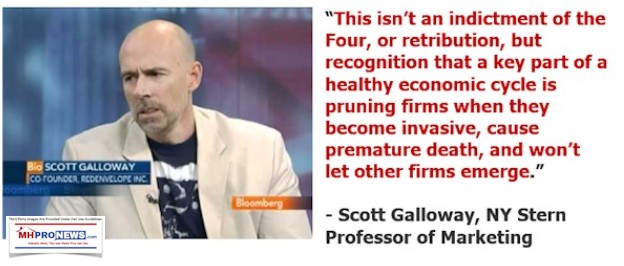
- Monopolization is perhaps one of the top issues for 2020 and beyond. More are beginning to understand that point. While we tend to focus, of course, on that trend in manufactured housing, it is an issue that impacts the nation far more broadly.
Related Reports:
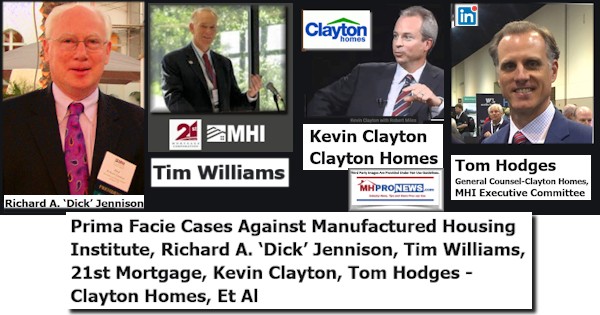
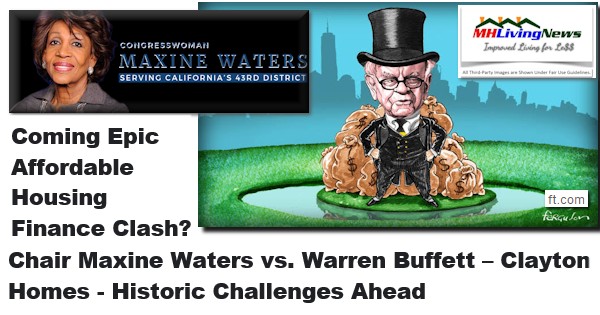
Manufactured Double Talk? Analyzing New Land-Lease Manufactured Home Community Developments


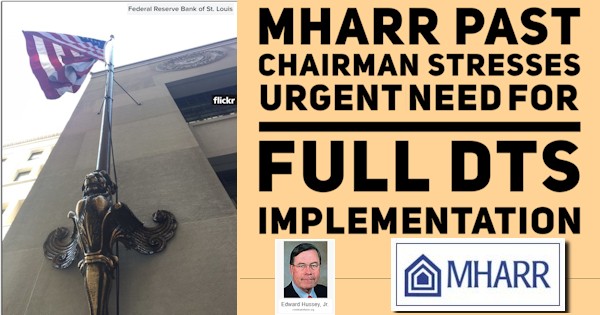

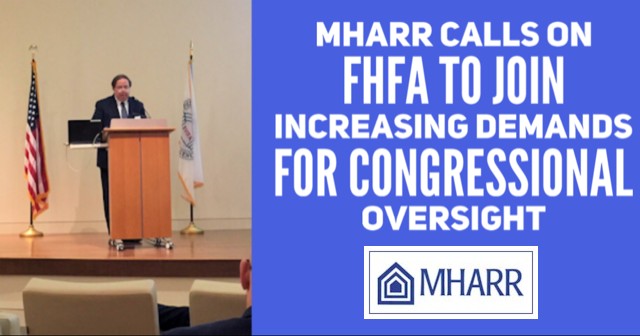
Manufactured Housing Industry Investments Connected Closing Equities Tickers
Some of these firms invest in manufactured housing, or are otherwise connected, but may do other forms of investing or business activities too.
-
-
-
-
- NOTE: The chart below includes the Canadian stock, ECN, which purchased Triad Financial Services, a manufactured home industry lender
- NOTE: Drew changed its name and trading symbol at the end of 2016 to Lippert (LCII).
-
-
-

Winter 2020…
Berkshire Hathaway is the parent company to Clayton Homes, 21st Mortgage, Vanderbilt Mortgage and other factory built housing industry suppliers.
· LCI Industries, Patrick, UFPI, and LP each are suppliers to the manufactured housing industry, among others.
· AMG, CG, and TAVFX have investments in manufactured housing related businesses. For insights from third-parties and clients about our publisher, click here.
Enjoy these ‘blast from the past’ comments.

MHProNews. MHProNews – previously a.k.a. MHMSM.com – has now celebrated our tenth anniversary.
Learn more about our evolutionary journey as the industry’s leading trade media, at the report linked below.
· For expert manufactured housing business development or other professional services, click here.
· To sign up in seconds for our industry leading emailed headline news updates, click here.
Disclosure. MHProNews holds no positions in the stocks in this report.

(Image credits and information are as shown above, and when provided by third parties, are shared under fair use guidelines.)
Submitted by Soheyla Kovach, co-managing member of LifeStyle Factory Homes, LLC and co-founder for MHProNews.com, and MHLivingNews.com.
Connect with us on LinkedIn here and here.

























